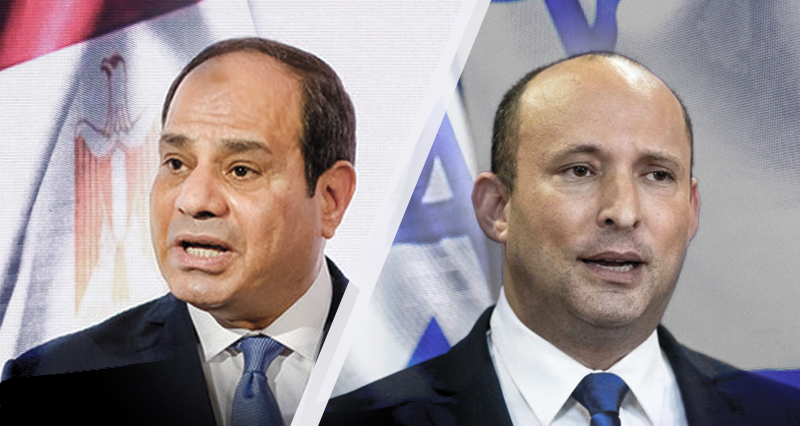The phone call made by Egyptian President Abdel Fattah Al-Sisi to the new Israeli Prime Minister, Naftali Bennett, on the occasion of the latter’s assumption of office seemed like nothing out of the ordinary… However, it is somewhat different this time given that it comes within the framework of Cairo’s keenness to ensure the pace and efficiency of relations with Tel Aviv.
The call was a message from the Egyptian administration to stress that relations between the two countries are not linked to the person or composition of the new government, especially after the departure of Israeli Prime Minister Benjamin Netanyahu who had held the position since 2009.
A fragile government
The new structure of the Israeli government is fragile, which confirms that the ability to make decisions in general will be difficult, but the exception to that will be what the Israeli security institutions have agreed upon.
Despite Egypt’s awareness of that fact, it wants political assurances to move forward with what was agreed upon in the last Gaza war, and what it ended with in terms of the cease-fire, and the mechanisms that ended up stabilizing the situation, the exchange of prisoners, and the reconstruction of Gaza.
Egypt views the steps that have been taken as an important beginning that could then pave the way for a positive atmosphere for re-launching the peace negotiations.
The current Israeli political situation is not new to the veterans in dealing with Israel, as Israeli leadership has formed a joint government before between the Likud and Labor in the 1980s.
However, this new government will be new in everything from its formation to its practices of regional and international politics at a critical moment with the war that took place, and its global consequences that generated new forces that criticize Israel even in the United States of America and the Jews in the West.
Limited chances for peace
It can be said that the current Israeli government coalition cannot agree on anything, not only because of the contradictory orientations of its components, but because it presents an elderly generation of politicians competing with each other in extremism and fanaticism. This specifically could threaten any Egyptian attempts to put the Palestinian issue on any peaceful path to a solution.
One look at the new government will lead to the conclusion that whoever negotiates with Israel will initially have to negotiate with the various Israeli factions, some of whom support the two-state solution but oppose the division of Jerusalem, which the Palestinians want as the capital of their future state.
In light of this, the Egyptian President’s contact with the Israeli Prime Minister reflects Cairo’s desire to revitalize relations with Tel Aviv, to ensure the continuation of the effectiveness of political contacts aimed at achieving Egyptian interests in achieving an actual calm in preparation for any efforts to revive the peace process with the aim of establishing a Palestinian state, which is an issue of multidimensional importance to Egypt.
But the Egyptian understanding of the level that relations with Israel should reach does not stop at the level of political and security contacts to play a mediating role in the Palestinian issue.
Cairo has been seeking for some time to increase the intertwining of relations with Tel Aviv, to ensure the highest degree of influence on issues related to its national security. Therefore, and being aware of the nature of the political situation that Israel is witnessing with the failure of repeated elections to reach a stable government, Egypt has sought during the last period to activate economic relations with the Hebrew state.
The Egyptian administration believed that the previous Israeli government’s success in concluding cooperation and peace agreements with some Arab countries would detract from its balance in relations with Tel Aviv, so it rushed to exploit the recent attacks on Gaza to prove the effectiveness of the Egyptian role in the Palestinian cause. However, this will not be enough.
In Cairo’s view, the chances of achieving a new launch of the peace process under the new government may be limited, so it will tend more to a greater revitalization of economic relations.
New areas
There are expectations that the economic cooperation between the two countries will extend to the expansion of the “QIZ” agreement based on an Israeli demand that has been repeated in recent years more than once, and Cairo has reserved its details. Therefore, developing relations will later require moving from stable relations to new areas that have not been approached since years.
Egypt was aware of the fact of the imminent departure of the Netanyahu government, so it anticipated that months ago by sending the Egyptian Minister of Petroleum Tarek El Molla to discuss a number of related areas of cooperation as a starting blow to revitalizing economic relations.
In the view of many observers, Cairo has appeared in recent years more pragmatic in its attempts to deal with Israel as a state and not as a government, which explains its tireless efforts among economists, and its focus on investing in oil and energy security, and not with the aim of conducting political contacts.
This Egyptian desire is linked to financial and economic aspirations that it is working on, by employing the great Egyptian capabilities and its specialized structure, not only the two liquefaction stations in Idku and Damietta, to be an energy center in the region. It is now in partnership with the Israeli side to transport gas to Egypt, then export it according to the mechanisms of the international market from the eastern Mediterranean region to Europe.
This view, in line with the efforts Egypt has made in recent years, has resulted in little worry about a change in the driving seat in Israel.
Thus, Cairo is actually entangled with the oil market in terms of trade and investment, and far from the peace agreements.
From reaction to action
There are criticisms that Cairo is trying to regain the ground it lost by entering Arab countries by seeking peace with Tel Aviv, i.e. starting the trend towards implementing the ideas of economic peace in the region. Nevertheless, some observers praise these recent policies, considering that it has lost a lot of its succumb to popular blackmail that refuses to develop economic relations with Israel.
However, in my view, the truth is neither nor. What Egypt is doing is nothing but a response to Cairo’s concern about regional cooperation projects, such as the proposed gas stations project in Haifa and others, new gas lines, reconnecting ports and roads, and changing oil and gas transportation routes through Arab international partnerships, projects that have a negative impact on the Suez Canal.
In my opinion, Egypt is moving from reaction to action by building a complex network of interests – political and economic – with the Israeli side that allows it effective cards in preventing any negative damage to its national security or economic interests.
An opportunity and a test
Therefore, Egypt views the new Israeli government as an opportunity through which Egypt can test the strength of relations with Tel Aviv, as well as the possibility of deepening the intertwining of economic interests.
Economic interests are not limited to energy issues only. There are still outstanding issues with Tel Aviv, as the former did not demarcate its maritime borders with the latter, nor did it delineate its borders with Gaza, although it did so with Greece and Cyprus.
If Cairo succeeds in developing its various relations with the new Israeli government in a way that it is not limited to the traditional interest in the Palestinian issue, it will have succeeded in the process of “repositioning” in form and content.
This may achieve a goal that Israel has long desired in relations with Egypt, but it will nevertheless serve the Egyptian roles in preserving the rights of the Palestinians from the tampering practiced by some dishonest regional parties, some of which have exploited them to achieve political agendas away from the essence of the issue.
Egypt’s success in achieving this goal will help Cairo be a key partner in some of the Israeli security and regional projects in the Red Sea and the Gulf of Aqaba, in order to ensure that the balances of these projects are controlled so that they do not end up opposing its interests or being at its expense.









Leave a Reply